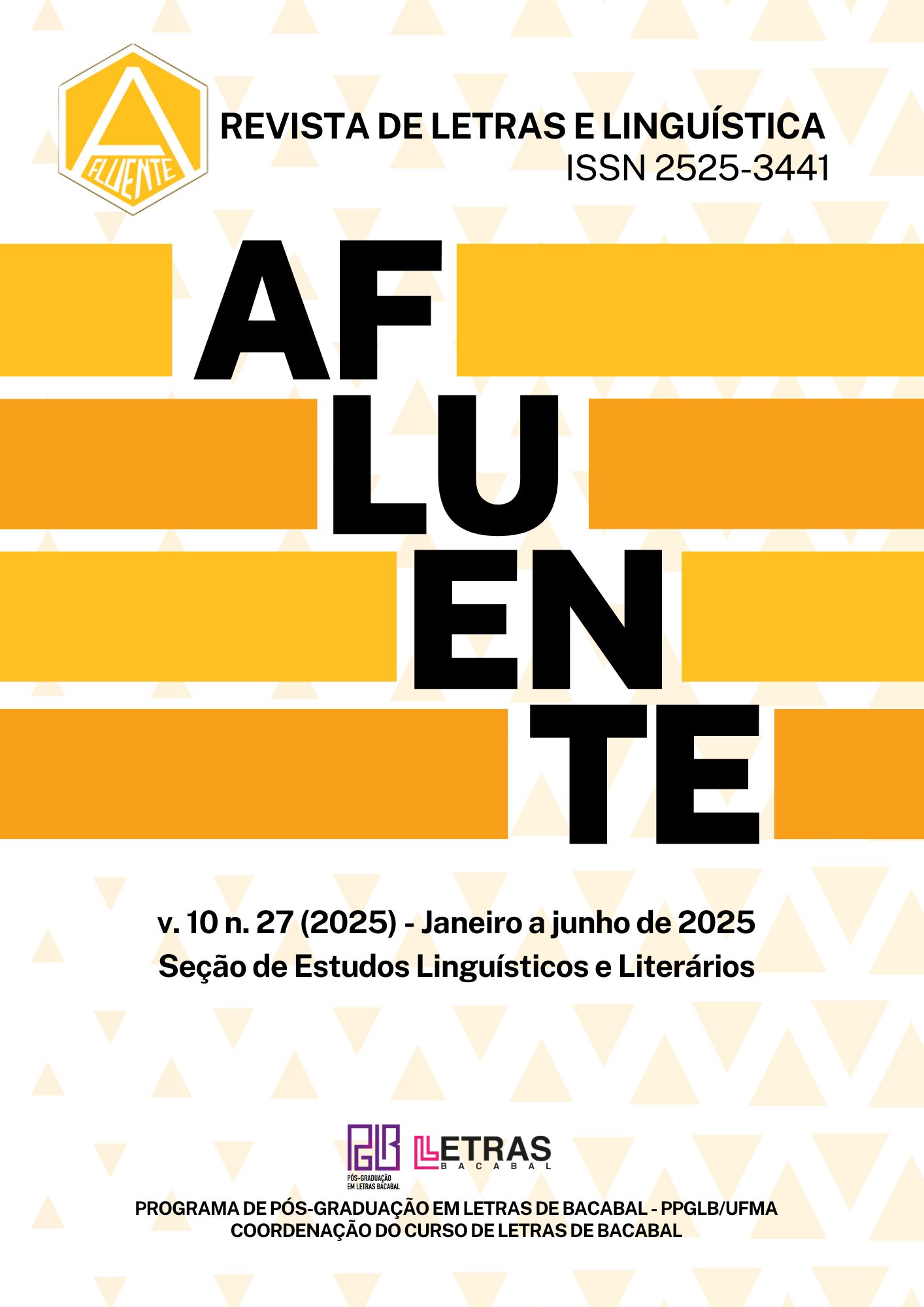Historical and geolinguistic traces of the lexical unit 'peteca' in indigenous and non-indigenous territories of Pernambuco
DOI:
https://doi.org/10.18764/2525-3441v10n27.2025.13Keywords:
Lexicon, Peteca, Pernambuco, Historical Marks, Indigenous and Non-indigenous TerritoriesAbstract
This study investigates the distribution, meanings, and historical motivations associated with the lexical unit "peteca" in Pernambuco, based on data from the state's linguistic atlases and the emerging corpus of the Linguistic Atlas of Indigenous Areas of Agreste and Sertão. Grounded in the contributions of Cardoso (2010) and Thun and Elizaincín (2000) on Geolinguistics and Dialectology, it seeks to understand the diatopic variation of the lexeme, while Ethnolinguistics, based on Duranti's (1997) assumptions, enables the identification of cultural and historical aspects that support the analysis in indigenous and non-indigenous territories. In this sense, the main objective is to examine the marks of interethnic contact and lexical processes. To this end, the methodology employs a geolinguistic and ethnolinguistic approach, combining the cartographic analysis of the term's dispersion with the study of the sociocultural context of the investigated survey points. As analytical perspectives, it is expected to identify diachronic traces in the distribution of the lexical item, highlight indigenous substrates in its semantic constitution, and understand the effects of territoriality on its maintenance and lexical innovation. The results will contribute to studies on linguistic diversity, demonstrating how linguistic atlases, by recording lexical phenomena in different geographical spaces, play a relevant role in documenting and valuing Brazilian linguistic and cultural heritage.
Downloads
References
ASENSIO, M.O. Gran diccionario español portugués, português espanhol. Espasa Calpe, 2001
BAUMAN, R. e SHERZER, J. The Ethnography of Speaking. Annual Review of Anthropology, vol. 4, 1975, pp. 95–119.
CALAME-GRIAULE, G. Ethnologie et langage. In: CALAME-GRIAULE, G. Des cauris au marché: Essais sur des contes africains. (Publié avec le concours du Centre national des Lettres.) Paris : Société des Africanistes, 1987.
CAMBRIDGE ESSENTIAL ENGLISH DICTIONARY. Cambridge: Cambridge University Press, 2011.
CARDOSO, S. A. M. et al. Atlas Linguístico do Brasil: cartas linguísticas 1. Londrina: Eduel, 2014.
CARDOSO, S. A. M. Geolinguística: tradição e modernidade. São Paulo: Parábola Editorial, 2010.
CASCUDO, L. da C. Dicionário do folclore brasileiro. 11. ed. São Paulo: Global, 2001.
COLLINS Dicionário Inglês - Português / Português - Inglês. 1. Ed. São Paulo: Collins, 2005.
CRUZ, M. L. de C. Atlas Linguístico do Amazonas – ALAM. Tese (Doutorado em Letras). Rio de Janeiro: Universidade Federal do Rio de Janeiro, 2004.
DURANTI, A. Linguistic anthropology. Cambridge: Cambridge University Press, 1997.
HOUAISS, A. Dicionário Houaiss da língua portuguesa. Rio de Janeiro: Objetiva, 2009.
HYMES, D. Foundations in Sociolinguistics: An Ethnographic Approach. London: Tavistock Publications Limited, 1974.
LABOV, W. Sociolinguistic patterns. Philadelphia, PA: University of Pennsylvania Press, 1972.
LYRA FILHO, J. Introdução à sociologia dos desportos. Rio de Janeiro: Bloch Editores, 1973.
MEILLET, A. Bull. de la Soc. de Ling. de Paris, t. XXX, 1929. In: POP, S. Aperçu historique sur le développement de la dialectologie. Vols.1. Louvain : Chez l’auteur. Gembloux, 1950.
MILROY, L.; GORDON, M. Sociolinguistics: method and interpretation. Oxford: Blackwell, 2003.
NAVARRO, E. de A. Dicionário de tupi antigo: a língua indígena clássica do Brasil. São Paulo: Global, 2013.
NOMISO, C. M. Possibilidades da cultura japonesa na prática pedagógica: um caso a ser estudado. Dissertação (Mestrado profissional - Docência para a Educação Básica) - Universidade Estadual Paulista (UNESP). Faculdade de Ciências de Bauru, Bauru, 2022, 160p.
POP, S. Aperçu historique sur le développement de la dialectologie. Vols.1 e 2. Louvain : Chez l’auteur. Gembloux, 1950.
RANDOM HOUSE WEBSTER'S COLLEGE DICTIONARY. Random House. New York, 1997.
RAZKY, A.; RIBEIRO, C. M. da R.; SANCHES, R. D. Atlas linguístico do Amapá. São Paulo: Labrador, 2017.
SÁ, E. J. de et al. Atlas Linguístico Bidimensional do Sertão do Pajeú Pernambucano. Monografia (Especialização em Língua Portuguesa). Arcoverde: CESA, 2019.
SÁ, E. J. de. Atlas Linguístico de Pernambuco. Tese (Doutorado em Letras). João Pessoa: UFPB, 2013.
SÁ, E. J. de. Atlas Linguístico Quilombola do Moxotó-Ipanema Pernambucano (ALQUIMIPE). Relatório de Pós-Doutorado. Belém: Universidade Federal do Pará, 2018.
SALLES, J. G. do C; MOTTA, I.; PEREIRA JÚNIOR, C. C. Peteca. In: COSTA, L. P. da (org). Atlas do Esporte no Brasil. Shape: Rio de Janeiro, 2005.
SALVADOR, G. Lexicografía y geografía lingüística. REL, 10,1 1980.
SANCHES, R. Atlas Linguístico dos Karipuna do Amapá. 1. ed. Rio Branco - AC: NEPAN, 2020.
SAPIR, E. Le langage. Introduction à l’étude de la parole. Québec: Édition électronique réalisée en 2001.[1921]
SILVA, F. Atlas Linguístico da Pedra. Monografia (Especialização em Língua Portuguesa). Arcoverde: CESA, 2018.
SILVA-CORVALÁN, C. Sociolinguística: teoria y análisis. Madrid: Editorial Alhambra, 1989.
SOBIERAJSKI, J. L. Política do Direito Desportivo Brasileiro. Dissertação (Curso de Pós-Graduação em Direito). Santa Catarina. UFSC. 1997.
TARALLO, F. A pesquisa sociolinguística. Série Princípios, São Paulo: Ática. 1986.
THUN, H. O português americano fora do Brasil. In: GÄRTNER, E.; HUNDT, C.; SCHÖNBERGER, A. (Org.). Estudos de geolinguística do português americano. Frankfurt am Main: TFM, 2000. p. 185-227.
THUN, H.; ELIZAINCÍN, A. Atlas diatópico y diastrático del Uruguay (ADDU), I, 1-2, Kiel: Westensee-Verlag, 2000.
WEINREICH, U. Is a structural dialectology possible? Word v.10, n.4, New York: Linguistic Circle of New York. 1954.pp.388-400.
Downloads
Published
How to Cite
Issue
Section
License
Copyright (c) 2025 Afluente: Revista de Letras e Linguística

This work is licensed under a Creative Commons Attribution 4.0 International License.
Direitos autorais Afluente: Revista Eletrônica de Letras e Linguística
Este trabalho está licenciado com uma Licença Creative Commons - Atribuição 4.0 Internacional.














